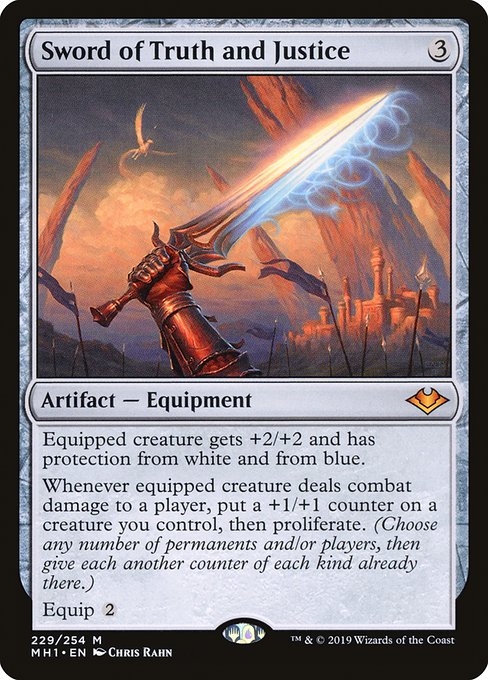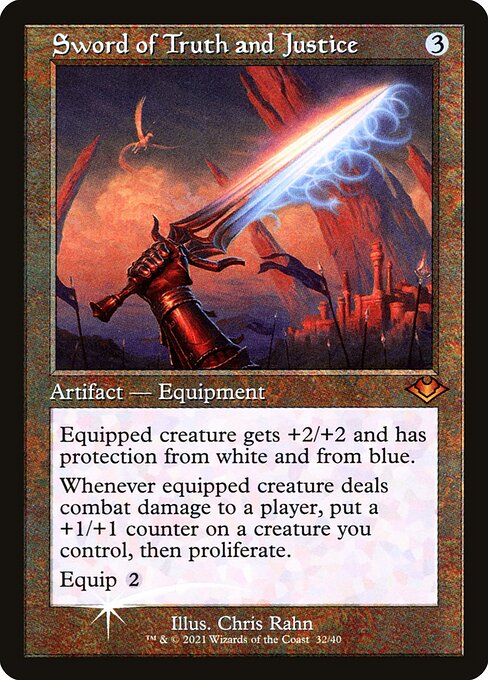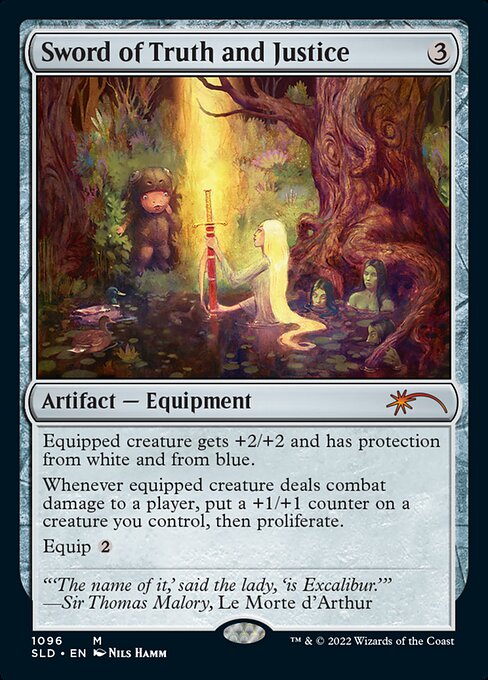standard
future
historic
gladiator
pioneer
explorer
modern
legacy
pauper
vintage
penny
commander
brawl
alchemy
paupercommander
duel
oldschool
premodern
Rulings
Protection from a color means that the equipped creature can’t be blocked by creatures of that color, can’t be the target of spells of that color or abilities from sources of that color, can’t be enchanted or equipped by Auras or Equipment of that color, and all damage that sources of that color would deal to it is prevented. Nothing other than these events is prevented or illegal.
If a permanent or player you choose while proliferating has more than one kind of counter on it, it will get one more of each of those kinds. This means that if you put a +1/+1 counter on a creature you control with a -1/-1 counter on it, then choose that creature while proliferating, you’ll put another of each of those counters on it before state-based actions remove them.
You don’t have to choose every permanent or player that has a counter, only the ones you want to add another counter to. Since “any number” includes zero, you don’t have to choose any permanents at all, and you don’t have to choose any players at all.
Players can respond to a spell or ability whose effect includes proliferating. Once that spell or ability starts to resolve, however, and its controller chooses which permanents and players will get new counters, it’s too late for anyone to respond.
If a permanent has +1/+1 counters and -1/-1 counters on it, they’re removed in pairs as a state-based action so that the permanent has only one of those kinds of counters on it.
To proliferate, you can choose any permanent that has a counter, including ones controlled by opponents. You can’t choose cards in any zone other than the battlefield, even if they have counters on them.
If a permanent or player you choose while proliferating has more than one kind of counter on it, it will get one more of each of those kinds. This means that if you put a +1/+1 counter on a creature you control with a -1/-1 counter on it, then choose that creature while proliferating, you’ll put another of each of those counters on it before state-based actions remove them.
You don’t have to choose every permanent or player that has a counter, only the ones you want to add another counter to. Since “any number” includes zero, you don’t have to choose any permanents at all, and you don’t have to choose any players at all.
Players can respond to a spell or ability whose effect includes proliferating. Once that spell or ability starts to resolve, however, and its controller chooses which permanents and players will get new counters, it’s too late for anyone to respond.
If a permanent has +1/+1 counters and -1/-1 counters on it, they’re removed in pairs as a state-based action so that the permanent has only one of those kinds of counters on it.
To proliferate, you can choose any permanent that has a counter, including ones controlled by opponents. You can’t choose cards in any zone other than the battlefield, even if they have counters on them.
Rulings
Protection from a color means that the equipped creature can’t be blocked by creatures of that color, can’t be the target of spells of that color or abilities from sources of that color, can’t be enchanted or equipped by Auras or Equipment of that color, and all damage that sources of that color would deal to it is prevented. Nothing other than these events is prevented or illegal.
If a permanent or player you choose while proliferating has more than one kind of counter on it, it will get one more of each of those kinds. This means that if you put a +1/+1 counter on a creature you control with a -1/-1 counter on it, then choose that creature while proliferating, you’ll put another of each of those counters on it before state-based actions remove them.
You don’t have to choose every permanent or player that has a counter, only the ones you want to add another counter to. Since “any number” includes zero, you don’t have to choose any permanents at all, and you don’t have to choose any players at all.
Players can respond to a spell or ability whose effect includes proliferating. Once that spell or ability starts to resolve, however, and its controller chooses which permanents and players will get new counters, it’s too late for anyone to respond.
If a permanent has +1/+1 counters and -1/-1 counters on it, they’re removed in pairs as a state-based action so that the permanent has only one of those kinds of counters on it.
To proliferate, you can choose any permanent that has a counter, including ones controlled by opponents. You can’t choose cards in any zone other than the battlefield, even if they have counters on them.
If a permanent or player you choose while proliferating has more than one kind of counter on it, it will get one more of each of those kinds. This means that if you put a +1/+1 counter on a creature you control with a -1/-1 counter on it, then choose that creature while proliferating, you’ll put another of each of those counters on it before state-based actions remove them.
You don’t have to choose every permanent or player that has a counter, only the ones you want to add another counter to. Since “any number” includes zero, you don’t have to choose any permanents at all, and you don’t have to choose any players at all.
Players can respond to a spell or ability whose effect includes proliferating. Once that spell or ability starts to resolve, however, and its controller chooses which permanents and players will get new counters, it’s too late for anyone to respond.
If a permanent has +1/+1 counters and -1/-1 counters on it, they’re removed in pairs as a state-based action so that the permanent has only one of those kinds of counters on it.
To proliferate, you can choose any permanent that has a counter, including ones controlled by opponents. You can’t choose cards in any zone other than the battlefield, even if they have counters on them.
Votre collection ? vos decks ?
Envie de gérer votre collection et/ou créer des decks ?



 0
0
 29.50€
29.50€
